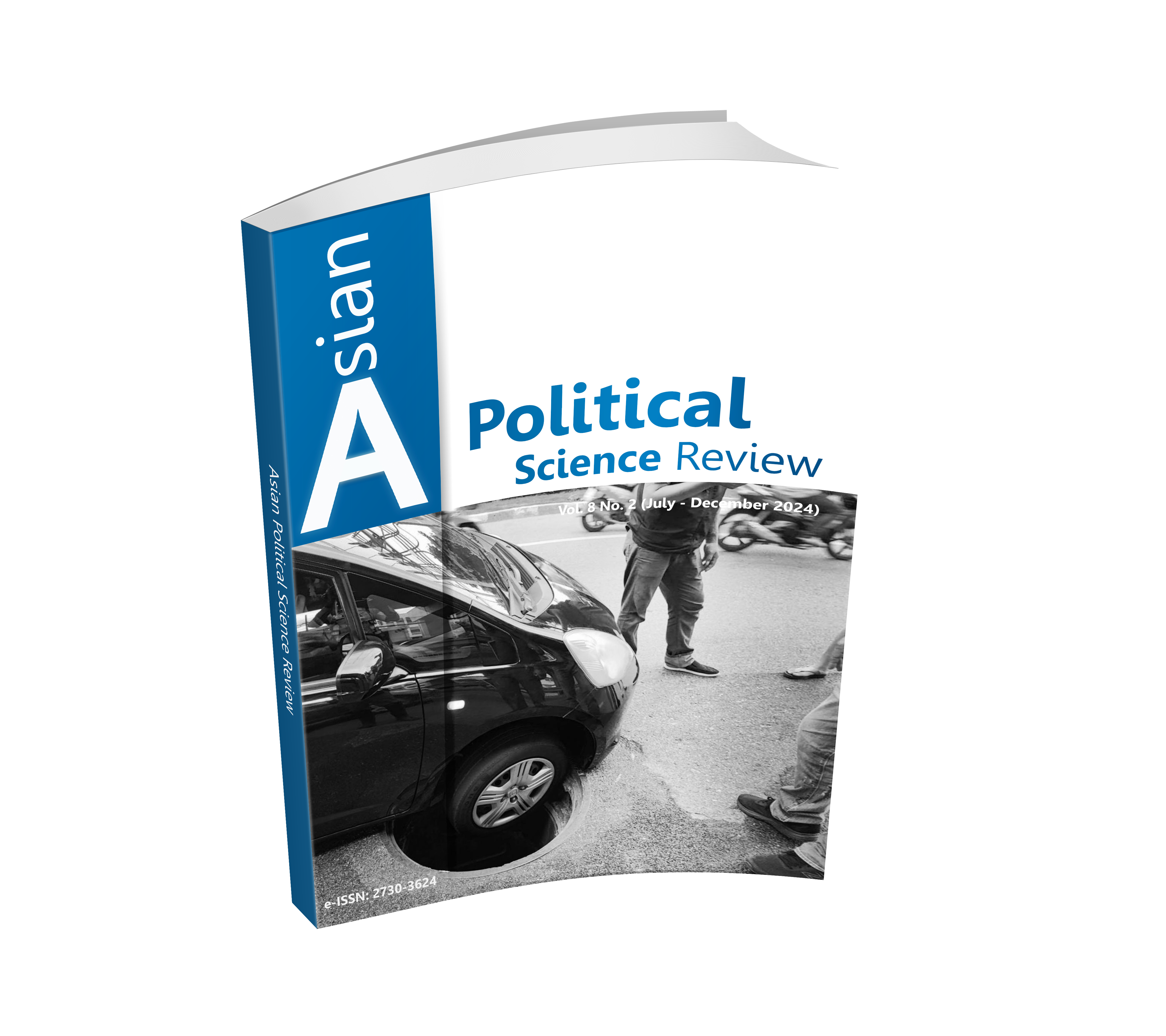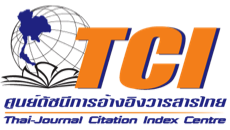HAPPINESS BASED ON THE HAPPY WORKPLACE CONCEPT OF MILITARY OFFICIALS: EVIDENCE IN THAILAND
DOI:
https://doi.org/10.14456/apsr.2024.11Keywords:
Happiness, Happy Workplace, Happinometer, Military Official, ThailandAbstract
The objectives of this research were to study the level of happiness based on the happy workplace concept of military officials and analyze how many elements the happiness based on the happy workplace concept of military officials were. The sample for this research consisted of 340 military officers in Thailand. The data were analyzed using arithmetic mean, standard deviation, and structural validity was checked through confirmatory factor analysis. The research results revealed that the overall level of happiness based on the happy workplace concept of military officials was high. The aspect with the highest score was relaxation, while social well-being scored the lowest. The elements of happiness according to the happy workplace concept for military officers were found to include, in order of importance: relaxation, spirituality, passion for learning, family well-being, financial health, generosity, physical health, and social well-being. Relevant agencies can apply these conceptual frameworks to enhance the happiness of their personnel and create a happy workplace.
Downloads
References
Amornvitthavat, D., & Sintao, N. (2023). 21st Century Competency Development Model for Command and General Staff College Student. Journal of Interdisciplinary Research: Graduate Studies, 12(1), 139-154.
Bovornusvakool, K. (2017). Enhancing the Quality of Life and Working Happily. Retrieved from http://tpso4.m-society.go.th/index.php/th/tpso-news/2017-05-16-15-16-27/43-happy-workplace-8.
Burton, J. (2010). WHO healthy workplace framework and model: Background and supporting literature and practices. Geneva: World Health Organization
Dive, B. (2004). The Healthy Organization. Virginia: Kogan Page.
Hair, J., Black, W., Babin, B., & Anderson, R. (2010). Multivariate Data Analysis: A Global Perspective. 7th ed. Essex: Pearson Education Ltd.
Homkrun, M. (2019). Morale in the Workforce Mobile Development Unit 13, Development Agency Region 1, Military Development Command Kaeng Krachan District Phetchaburi Province. Lawarath Social E-Journal, 1(3), 15-26.
Kaeodumkoeng, K., & Junhasobhaga, J. (2018). Effects of Happy Workplace Program in Companies of Thai Garment Industry. PSAKU International Journal of Interdisciplinary Research, 7(1), 52-61.
Kittinorarat, J. (2022). The Antecedents of Happiness at Work and Its Impact on Organizational Citizenship Behavior Among Staff in Public Higher Education Institutions in Thailand. PSAKU International Journal of Interdisciplinary Research, 11(2), 19-32.
Kline, R. (2015). Principles and Practice of Structural Equation Modeling. 4th ed. New York: Guilford Press.
Kumnoy, P., & Khoompoon, S. (2014). The Study Morale and Encouragement in the Operation of Non-Commission Soldier Battalion Cavalryman 3rd Cavalry Squadron Kings Guard. Journal of Graduate Studies Valaya Alongkron Rajabhat University, 8(1), 274-287.
Lowe, G. (2004). Health Workplace Strategies: Creating Change and Achieving Results. British Columbia: Graham Lowe Group Inc.
Nakjakhe, S., & Chunnapiya, S. (2014). Organizational Commitment of Military Officers in Engineer Department, Fort Bhanurangsi, Ratchaburi. Journal of Interdisciplinary Research: Graduate Studies, 3(2), 142-151.
Organizational Health Support Office. (n.d.). Happy Workplace. Retrieved from https://happy8workplace.thaihealth.or.th/about/what-is-it.
Prasartsin, S., & Yanavuddho, B. (2016). The Happy Way of Life of Retired Civil Servants According to the Integrative Buddhist Principles. PSAKU International Journal of Interdisciplinary Research, 5(2), 63-68.
Sepetch, J., & Banchuen, J. (2014). Quality of Working Life and Organizational Commitment of the Non-Commissioned Officers in the Engineer Department. Journal of Interdisciplinary Research: Graduate Studies, 3(2), 85-92.
Sommay, V., & Pavapanunkul, S. (2021). Desirable Factors for Future Military Leaders to Create an Organization of Happiness 1st Army Support Command Ko Chan District Chonburi Province. Journal of Mani Chettha Ram Wat Chommani, 4(1), 27-35.
Suaysuwan, S., & Chansom, N. (2021). Debt Status: A Case Study of Non-Commissioned Officers in the Armed Forces Security Center, Royal Thai Armed Forces Headquarters. National Defence Studies Institute Journal, 12(1), 94-105.
Sudsakorn, T. (2019). Management Factors Influencing the Management of the Happy Workplace for Police Stations in Thailand. PSAKU International Journal of Interdisciplinary Research, 8(1), 110-118.
Suebthamma, A., & Jaija, B. (2023). Guidelines for Improving the Quality for Life of the Non-Commissioned Officers under the 19th Military Circle. Procedia of Multidisciplinary Research, 1(7), 126.
Termlap, N., & Noppanatwongsakorn, R. (2023). Factors Affecting Happiness at Work of Personnel who work at The Directorate of logistics Royal Thai Army in Bangkok Area. Phimoldhamma Research Institute Journal, 10(3), 197-211.
Tonwan, K., Kalawong, S., & Subprasobchock, M. (2020). Happy Organization of Directorate of Joint Intelligence, Royal Thai Armed Forces Headquarters. Valaya Alongkorn Review, 10(1), 1-12.
Toomkerd, P., & Piriyarangsan, S. (2019). Economic Stability of Group of Workers Who Are Employees in the Cleaning Business: Case Study of Roys Services Co., Ltd. Asian Political Science Review, 3(1), 12-24.
Wasanthanarat, C. (2010). Happy Workplace Forum Seminar Documents. Bangkok: Thai Health.
Wasanthanarat, C., & Wutthiwatchaikaew, T. (2016). Let's Create a Happy Organization. Bangkok: At 4 Print.
Watthanabut, B., & Manasabutr, S. (2017). Happy Workplace according to Buddhist Way. PSAKU International Journal of Interdisciplinary Research, 6(1), 21-28.
Zaker, A., Dadsetan, A., Nasiri, Z., Azimi, S., & Rahnama, F. (2016). Effectiveness of Happiness on Self-efficacy of Students. Electronic Journal of Biology, 12(4), 333- 336.

Downloads
Published
How to Cite
Issue
Section
License
Copyright (c) 2024 Authors

This work is licensed under a Creative Commons Attribution-NonCommercial-NoDerivatives 4.0 International License.











.png)


